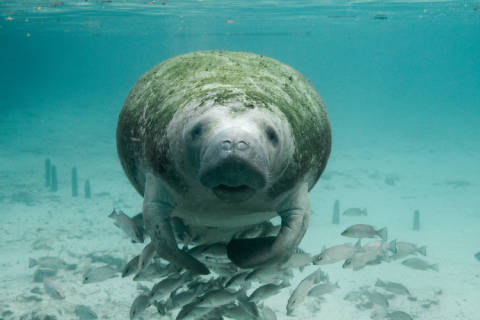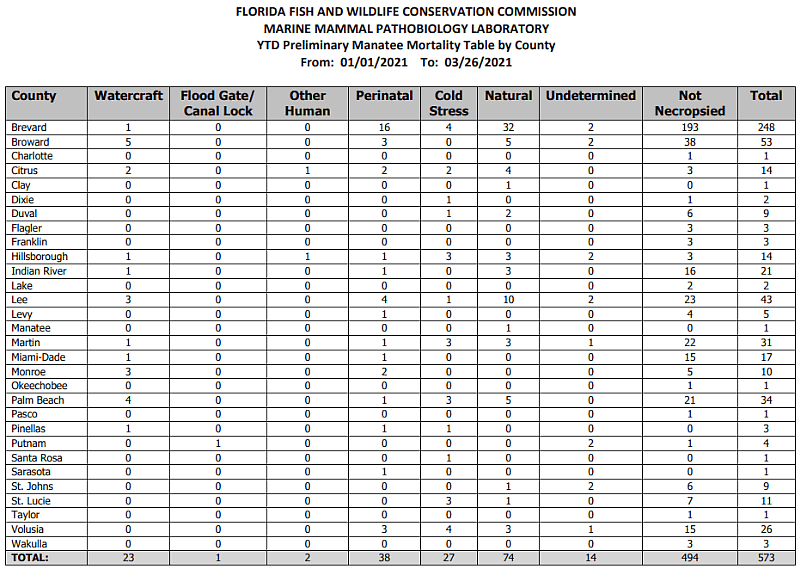IRLNews:2021-04-01/Indian River Lagoon Manatee Mortality Update
In 2016 there were an estimated 8,810 Florida manatees, 4,810 on the west coast and 4,000 on the east coast.[2] Manatees were reclassified from an endangered to a threatened species under the federal Endangered Species Act in May, 2017.
371 reported manatee deaths were within the Indian River Lagoon National Estuary watershed.[3]
In the first 85 days of 2021 Brevard County citizens reported 248 manatee deaths to FWC Wildlife Hotline at (888) 404-3922.
| County | 2/26/2021 | 3/26/2021 |
|---|---|---|
| Volusia | 16 | 26 |
| Brevard | 168 | 248 |
| Indian River | 13 | 21 |
| St. Lucie | 4 | 11 |
| Martin | 24 | 31 |
| Palm Beach | 29 | 34 |
| Total | 254 | 371 |
Brevard County Manatee Mortality
There are many factors affecting Brevard's manatee population. All due to human impact.
Natural Migration Interruption
There are an abnormal amount of manatees in the Port St. John's area of the North Indian River Lagoon due to the warm water discharge from the electric power plant. Manatees would normally migrate south as the temperature drops, but the power plant's warm water outflow distracts them from their natural migration. Port St. John's resident manatee population is estimated at 500 individuals, during cold weather the population may increase to well over a 1,000.
Loss of Seagrass
It is estimated that the Indian River Lagoon has lost 54% of the record high seagrass coverage recorded in 2007.[4] The bottom of the North IRL looks like a barren desert.
Manatees may eat up to 10% of their body weight daily and there just isn't enough seagrass growing in the North IRL to feed the unnaturally large population.
Web Links
- Winter Manatee Foraging Behavior and the Decline of Seagrass Beds in the Northern Indian River Lagoon USGS 2015
- FWC Update to the Statewide Florida Manatee Abundance Estimate
- Bloomberg Businessweek: Nobody Knows How to Wean Manatees Off of Power Plants
Documents
- FWC 2021 Preliminary Manatee Mortality Table (PDF 19pp 562KB)
- FWC 2021 YTD Manatee Mortality Table (PDF 1p 113KB)
- Updated Statewide Abundance Estimates for the Florida Manatee (PDF 27pp)
References
- ↑ FWC 2021 Preliminary Manatee Mortality Table (PDF 14pp 562KB), retrieved on 2021-04-01.
- ↑ Updated Statewide Abundance Estimates for the Florida Manatee (PDF 27pp), ISSN 1930-1448, page 5, retrieved 2021-04-01.
- ↑ FWC 2021 YTD Manatee Mortality Table (PDF 1p 113KB), retrieved 2021-03-07
- ↑ Dr. Chuck Jacoby, SJRWMD, 2020 Water Quality Presentation Video, retrieved: October 11, 2020




